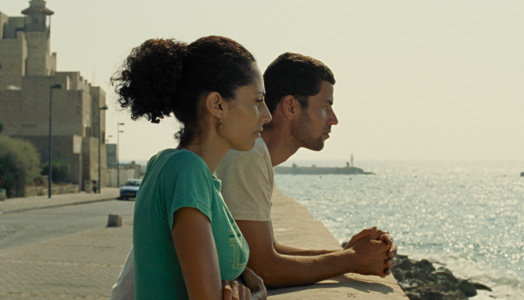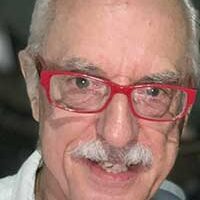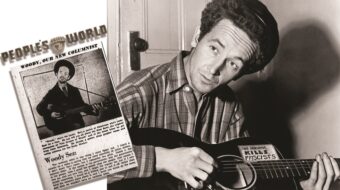
Part 5 of a series. See part 4, 3, 2, and 1.
Two new and totally different films about Palestinian refugee camps premiered at the 2012 Toronto International Film Festival.
When I Saw You is the first Arab film set in the turbulent times of the 1967 war. Eleven-year-old Tarek and his mother along with tens of thousands of refugees pour into a temporary refugee camp still housing residents from the 1948 Nakba. Overcrowded and poorly supplied, many have already lost a sense of being. But this is a time of hope with people fighting back, including the newly formed PLO along with liberation and anti-colonialist struggles all over the world. With a longing for his father and unaware of the newly defined borders, Tarek leaves his mother and the dread of camp life, takes off to the hills looking for freedom, and finds a group of resistance fighters training to regain their land. He quickly assimilates with this ragtag bunch as they afford him the hope and dreams of a better tomorrow.
Annemarie Jacir proved her skills in directing the award-winning Salt of This Sea, Palestine’s Oscar Entry for Best Foreign Film. Here she has created one of the most beautiful fantasies from one of the most tragic spots on earth. With a deep humanist style, some of the most attractive, believable and talented actors, including the amazing non-professional Mahmoud Asfa as Tarek, Ruba Blal as his mother and Saleh Bakri as the fedayeen leader, Jacir has brilliantly captured the beauty of the Palestinian people, and their hopes for a better life, in a deeply moving film.
Jacir was born and lived in the region until 16, then came to the U.S. for film studies. Although she has returned to live in Jordan she is denied the right to return to Ramallah in the West Bank. She lives now, as many Palestinians do, quite near the home that she will never be able to return to. Her personal experiences have infused her stories along with most of the actors who also come from the area.
The Palestinian refugee camp in Lebanon called Ain El-Heweh was home to Mahdi Fleifel in his formative years. He was able to leave, but visits frequently and takes movies. Motivated by a striking statement by David Ben-Gurion, Israel’s first prime minister, about the dispossessed Palestinians, that one day “the old will die and the young will forget,” Fleifel began to edit and assemble over 30 years of family footage to make sure the young will not forget. He has created perhaps one of the most touching “home movies” that have ever travelled the film festival circuit. A World Not Ours features, among many, the resilient grandfather Abu Osama, the tragic loner Uncle Said and lifelong friend Abu Iyad, who has never been able to leave the camp. Osama is constantly chasing the noisy kids away from his little spot in the alley where he hopes for some peace and quiet. Uncle Said, considered by some to be the village idiot, was a lot different before his brother was killed during the civil war in the 1980s. Iyad, who has gone through loyalty to almost every political faction that existed in the camp, is constantly trying to find a way out.
The richness of the characters, the catchy soundtrack, the innovative editing has resulted in a film that draws the viewer into a family as real as your own. The priceless ticket Mahdi owns to enter at such intensity this unseen world of refugees affords us the rare opportunity to see the reality and beauty of the people as we would never see otherwise. Young Irish-born producer Patrick Campbell has formed Nakba Filmworks along with Mahdi to help distribute this timely and wonderful film. They are proving that home movies can be turned into a meaningful work of art.
Another Palestine film, this time filmed within Israel, tells the tale of a prominent Palestinian doctor (Ali Suliman) working in Israel who slowly discovers his missing wife might be the person who exploded a bomb in a restaurant. He travels to the West Bank to find those persons who might have been responsible for turning her into a terrorist. The Attack, based on a book by Yasmina Khadra, is as much an intrigue as a philosophical exploration of violence as an option for social liberation. Why would someone choose to strap a bomb on themselves and kill innocent people? Are they a religious fanatic, a freedom fighter or possibly insane? The story shatters stereotypes by bringing understanding and humanism to those who choose violence for social change. No answers here, but rather a profound examination of the realities of the struggle in Palestine. It’s no coincidence that the film is produced by the great French Algerian director Rachid Bouchareb, who often in his films has dramatized the plight of his people in their quest for freedom from French occupation. Violence is seldom the first choice, but often the last choice.
The big-budget producers who brought you An Inconvenient Truth and Waiting for Superman, present State 194, laying out a defense of the two-state solution, as exemplified by the Palestinian Authority in its UN bid for statehood last year. Not that the two-state option or statehood is wrongheaded, but thanks to Israeli settlement expansion there is little land left to be considered for a state, and what does remain is like Swiss cheese. Despite this, PA Prime Minister Salam Fayyad struggles to meet the World Bank and IMF criteria for statehood, hoping to create a thriving capitalist economy amid the declining landmass of Palestine. Israeli political leaders have no intention of allowing this to happen, rather preferring to drive Palestinians out of their own land, or be conjoined with the world’s largest outdoor prison, the Gaza Strip. This film, with possible good intentions, implying that Palestinians really are capable of running their own state, goes out of its way to appease the corporate world and avoid criticism of Israel.
Two other Israeli films I was unable to see. The Gatekeepers features six leaders of the dreaded Israeli security force Shin Bet lamenting their leaders’ failures to create a stable Israel that feverishly builds settlements in the West Bank, among other foolish things. I mean, what’s going to be left to create a Palestinian state? And if you can’t have two states, what’s the other choice? One state with a majority of Palestinians.
Zaytoun, directed by Eran Riklis who gave us some beautiful humanist films about Palestinians (Lemon Tree, Syrian Bride, Human Resources Manager), is about a shot down Israeli fighter pilot who cleverly arranges with a young Palestinian refugee to find their way back home out of Lebanon. His films have about as much respect and compassion for Palestinians as Israeli films are allowed to have.
More information about the 2012 Toronto International Film Festival is at the festival website.
Photo: Salt of This Sea website.












Comments